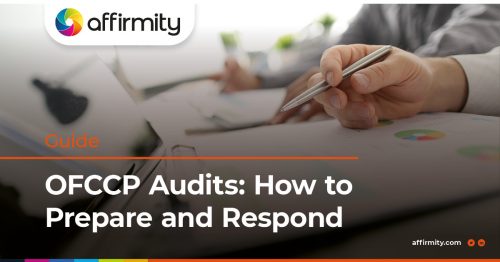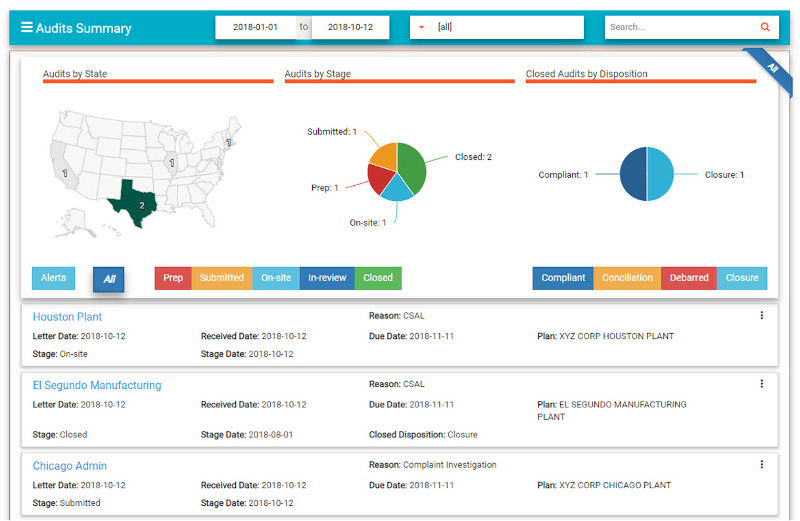Audit preparation and management should always be somewhere back of mind for HR, AA/EEO, and HR compliance professionals working for companies who are US Federal Contractors. With these tools and processes —originally detailed in our full guide, ‘OFCCP Audits: How to Prepare and Respond’—you’ll always be ready to spring into action when an OFCCP scheduling letter turns up.
In this blog post, we deal with considerations for the compliance review process specifically, although many of the principles are transferable to the various focused reviews and should inform your strategic approach regardless of whether you’re being audited or not.
How to Prepare for OFCCP Audits
The audit cycle begins with a pre-audit notification. The OFCCP will inform your organization that it’s getting ready to send you a letter regarding audit activity.
While reacting early is doubtlessly important, there are several ‘always on’ actions that will make receiving this letter simply a matter of routine. These involve you:
- Ensuring that your analysis for each year is accurate and drives actions. For example, if you have placement goals, adverse impact should drive your recruitment goals.
- Performing outreach that is always intentional, tracked, and evaluated
- Running steps analysis whenever adverse impact is uncovered, giving you insight into where certain groups fall out in the process
- Analyzing compensation annually: Compensation analysis is required on an annual basis for contractors
- Knowing your program and your data
- Reviewing your narrative to ensure you’re doing what you say
- Periodically reviewing applicant pools for diversity
- Periodically reviewing your processes, including personnel decisions/accommodations/pay/etc. and document the review
After you receive your scheduling letter, you should:
- Notify the team. Your internal and external stakeholders need to know that audit activity is incoming.
- Contact the OFCCP compliance officer in the letter and introduce yourself as the point of contact
- Begin reviewing the data and analysis to ensure accuracy. Particularly consider:
- Employee data, ensuring it matches the numbers in your Job Group Analysis (JGA)
- Applicant data
- Historical data, identifying where you have adverse impact/asterisks, and understanding the answers to these
The Dos and Don’ts of an OFCCP Audit
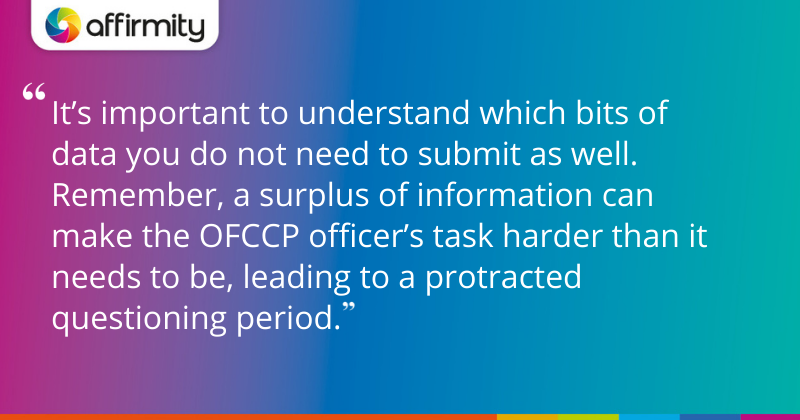
It’s important to understand which bits of data you do not need to submit as well. Remember, a surplus of information can make the OFCCP officer’s task harder than it needs to be, leading to a protracted questioning period.
When preparing your final submission, things will go more smoothly if you:
- Identify the submission items clearly for the compliance officer
- Review information under item 19 to ensure that the totals match your job group analysis (JGA) totals. Issues are common in this section specifically, often as a result of different approaches taken by different groups pulling the data together
- Account for accommodation request items for the review period. You need to have an accommodation policy and to have documentation proving that employees know how to get access to accommodations if they need them
- Include an account of outreach for the review period (items 7, 8, 11, and 12)
- Rely on your consultant where needed throughout the process. Affirmity’s consultants will always take another thorough look at everything so that when organizations submit they have confidence.
YOU MIGHT ALSO FIND THIS USEFUL | ‘The Why, How, and What of Good Faith Efforts: Why GFEs Are Important’
How to Use Tools and Template Documents to Manage Your Audits
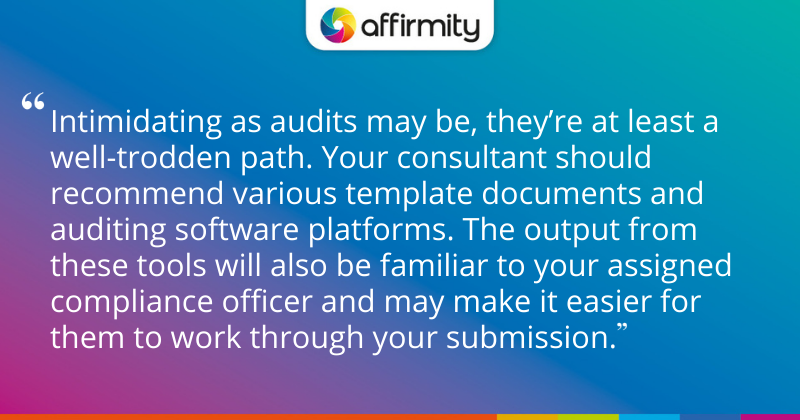
Intimidating as audits may be, they’re at least a well-trodden path. Your consultant should be able to recommend to you various template documents and fully-featured auditing software platforms that will make the process of collecting the necessary information a lot easier. The output from these tools will also be familiar to your assigned compliance officer and may make it easier for them to work through your submission.
Again, bear in mind that if you make it easy for compliance officers with a well-organized submission, the fewer follow-up questions you’re likely to get. In this way, template documents and auditing tools go a long way to making the auditing process a lot smoother.
The Importance of Accurate Recordkeeping
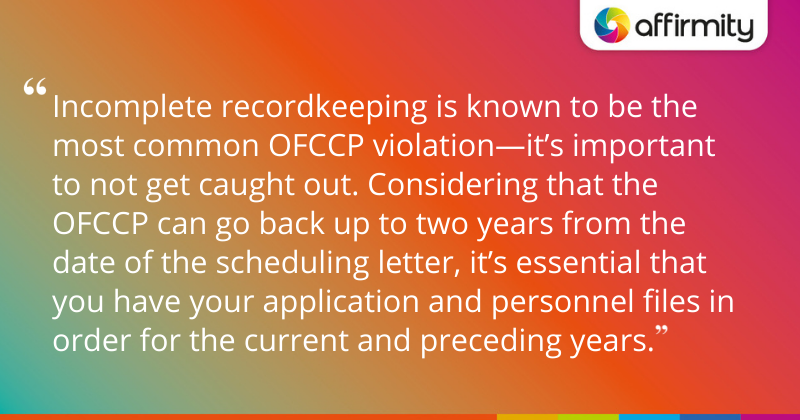
Incomplete recordkeeping is known to be the most common OFCCP violation—it’s important to not get caught out. Considering that the OFCCP can go back up to two years from the date of the scheduling letter, it’s essential that you have your application and personnel files in order for the current and preceding years.
Failure to do so can hamper your ability to reply to follow-up questions—such questions typically requiring a turnaround of 5-10 days of the officer’s query. To this end, you should prepare a document detailing hiring, promotion, demotion, and termination procedures/practices. Understanding these areas will allow you to know where you may have issues before the OFCCP flags them.
This document should be worked on as early as possible in the process, or ideally as an ongoing effort.
EVERGREEN ADVICE | ‘5 Ways to Prepare for Your 2021 Affirmative Action and Diversity Initiatives’
Tools for the Audit Period
Affirmity’s Audit Crosswalk Worksheet
It can be very intimidating once you receive the scheduling letter to read through and decipher the compliance review’s 22 items. The language of the scheduling letter is a step removed from the documents that satisfy each request, and translating it into a list of actions for the wider team to complete can feel unnecessarily time-consuming.
You’re definitely not alone in this! Through experience, the Affirmity team has built an explanation of the 22 items into our client support process. Once Affirmity is aware that an organization is being audited—either through our own checks of the annual CSAL or when notified by the client—clients are sent the audit crosswalk document.
This document is structured with each of the OFCCP’s items on one side against our list of which documents will need to be located or produced to satisfy the request. This allows you to check off each of the items as you go to ensure you have submitted all required information. It also ensures that clients understand which pieces of work are being put together by your Affirmity consultant.
Annual Self-Assessment of Outreach and Recruitment Efforts
Affirmity additionally provides an ‘annual self-assessment of outreach and recruitment efforts’ document to clients, allowing you to plot:
- Outreach/recruitment activity
- Date of activity
- Description
- Evaluation
Then:
- Assessment of effectiveness of totality of outreach/recruitment efforts
- Criteria for evaluation
The aim of this document is to not only remind clients of what you’re going to be asked for, but to also make outcomes easily identifiable, reducing the room for officer confusion.
BEYOND AFFIRMATIVE ACTION | ‘Leveraging your AAP for Better Workforce Insights’
Affirmity CRC’s Audit Manager Tool
Affirmity’s CRC has a built-in audit manager tool, allowing you to see audit progress, locations under audit, and audits that are closed. This gives you an at-a-glance view of your audit-related information. This will be most useful for larger organizations subject to multiple audits, so engage your consultant if you would like to use it.
OFCCP Audits: How to Prepare and Respond: Continue Reading
These tools and processes appear alongside even more great insights about the OFCCP auditing process from our team of experts. Download the full guide to learn about:
- The six different types of audit/focused review, and what you can expect from each
- Our top seven lessons learned through years of helping clients submit their responses to the OFCCP
- A round-up of frequently asked questions that drill into some specific scenarios and common concerns
Download the full guide today.
